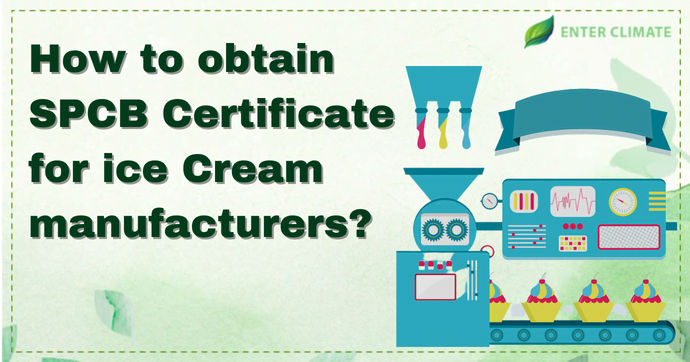How to obtain SPCB Certificate for ice cream manufacturers?
 12 Dec, 2022
12 Dec, 2022 
Ice creams offer joy that knows no bounds. From summer to monsoon and even winter, ice cream is a perfect treat that nobody misses, even at random gatherings, occasions and on festivities. Though this food delicacy is a consumable product of choice, it remains in massive demand throughout all seasons, and so does the ice cream industry. The credit goes to the different types of ice creams and brands evolving daily. But it must be noted that the ice cream manufacturing industries fall under the green category. Thus, obtaining an SPCB certificate for ice cream manufacturers becomes mandatory. The blog elaborates on the complete process to do so.
Market overview of the ice cream industry
As the world population multiplies in number, global economies improve, and urbanisation rates rise, the demand for indulgence products such as frozen desserts and ice cream has been steady. Furthermore, the forecasts are also promising. The ice cream market globally is predicted to reach a CAGR of 4.7% and a record US$73.2 billion by 2022.
Macroeconomic factors like rising disposable incomes and an increasing desire for indulgence treats are driving the ice cream industry to flourish rapidly and strongly worldwide. Notably, the Indian ice cream industry is anticipated to register overall value growth of over 50 % from 2019 to 2022. Thus, setting up this industry seems lucrative. To do so, one must apply for an SPCB certificate for ice cream manufacturers.
Key players in the Indian ice cream sector
The following names dominate the Indian ice cream market –
- Unilever
- GCMMF (Amul)
- Devyani Foods Industries Pvt. Ltd
- Wells Enterprises Inc.
- Havmor Ice Cream Limited
- HatsunAgro
Target Customer
Before obtaining an SPCB certificate for ice cream manufacturers, one must understand the target customer. Read about the same explained in detail below –
Supermarkets/shopping malls
The main focus of shops within shopping malls or supermarkets is to have many sections where they can effectively showcase and sell ice cream. If your ice cream brand and quality are good enough, these shops will be willing to buy your product to sell.
Local shops
Most local shops usually have a cooling machine or a small freezer for storing dairy products. Thus, these shops can be the primary target as well.
Dairies
Dairy shops also have different brands of ice cream. One can indeed approach them. The best part is that there are many dairies in each locality, offering you good exposure to fame your product.
Ice cream stores
Indeed, ice cream stores can be a crucial target shop for selling and displaying a product manufactured by you. However, a lot of convincing goes into this, as most shops have franchises of just one brand. But you can surely try once.
Important factors that must be considered before starting the ice cream industry
While applying for an SPCB certificate for ice cream manufacturers, one must consider certain factors like –
Switching between the new ingredients
In a survey conducted in India, 85% of respondents accepted that they sometimes/usually try different or new varieties while purchasing ice cream. While fruity and classic flavours continue to dominate, customers are eager to experiment with new tastes. The range includes millennials in the Asia-Pacific. In India, youth under 26 make up 53% of the population. This makes them the primary demographic for the frozen dessert and ice cream sector.
Health preferences
Although the Indian population looks out for indulgences, more customers are aware of ice cream’s high sugar and fat content. Indian consumers want the best of both worlds. Thus, they look for the ‘low fat’ health claims. Our country’s standard fat content in ice cream has been reduced to as low as 5%. But still, consumers are seeking even lower percentages. Thus, ice cream manufacturers are vigorously searching for solutions to respond to the trends.
Benefits of having ice cream
- Although the nutritional content of ice cream differs among types and brands, it is generally an excellent energy source.
- This food delicacy is also a dietary source of two essential minerals: phosphorus and calcium.
- Milk, used in making ice cream, is rich in iodine, an essential nutrient for lactating and expecting women. Iodine also plays a vital role in fetal brain development.
- Ice cream is packed with nutrients that can improve your immune system. The dessert comprises milk packed with nutrients and vitamins such as vitamin D, vitamin A, selenium and zinc, which are all vital for a healthy immune system.
Challenges faced by the ice cream manufacturers
Besides facing problems that may or may not arise while obtaining an SPCB certificate for ice cream manufacturers, owners may need help with various issues. Manufacturers in the Indian ice cream market must overcome significant challenges when offering efficient logistics and cold storage.
- Tier-II towns in the country experience frequent voltage fluctuations and power cuts, impacting the temperature at which the ice cream can be stored.
- Also, transportation costs in India are very high.
Equipment/machines needed to establish ice cream manufacturing unit
The operations of small-scale factories like ice cream manufacturing depend heavily on machinery. Thus, depending on your needs, choosing the right machinery is essential. Here are some basic, detailed machinery information for your ease.
- Cooled condenser
- Refrigeration compressor
- Spray nozzle assembly
- Liquid receiver
- Agitator assembly
- Brine tank
- Ice cream freezer
- Push cart
- Other electrical and mechanical accessories
The manufacturing process followed at the ice cream manufacturing unit
The following are the basic steps that go into ice cream production:
- pasteurisation
- blending
- homogenisation
- freezing
- hardening
- ageing the mix
- packaging
Licenses and permissions required to start manufacturing Ice cream
Every business entity planning or anticipating commencing the ice cream manufacturing industry must know the government licenses and permissions for running the unit. Obtaining the SPCB certificate for ice cream manufacturers is mandated. Apart from this, the following permissions and licenses are needed to establish an ice cream manufacturing unit –
Pollution certificate/NOC
Every entity must obtain the SPCB certificate for ice cream manufacturers. The Pollution NOC is granted in two stages regarding the processing mentioned above unit.
Consent to Establish (CTE)
Every occupier must get CTE for setting up the unit. CTE must be obtained from a specific Pollution Control Committee (PCC)/State Pollution Control Board (SPCB).
Consent to Operate (CTO)
Before operating the unit, every owner must obtain a CTO certificate. It is granted by the authority for a period between one and ten years, based on the business category and location.
Important information and documents needed to obtain an SPCB certificate for ice cream manufacturers
- PAN card of the unit
- UID and PAN card of the authorised person
- Project report
- Rent agreement or property paper
- Layout plan
- DIC certificate/Udyog Aadhar
- STP and ETP information
- CA certificate on investment
- Change of land use (if the unit is located in an agricultural area)
- CGWA NOC
- Water usage
- Air pollution control equipment details
- DG set (if any)
- AOA and MOA/partnership deed
- Manufacturing process
Procedure to get Pollution certificate/Authorisation/NOC
The following procedure must be followed to obtain the SPCB certificate for ice cream manufacturers –
- Generate user id and password
- Apply through the online portal
- Make the payment after submitting the documents
- An authorised officer, in the case of the CTO, will conduct an inspection
- The department will prepare a report
- The file is sent for the meeting by the head office or the regional officer as the case may be
- The license gets approved in the meeting by the head office or regional officer, as the case may be
- The applicant can get the certificate downloaded from the pollution control board’s website.
Other licenses needed by the ice cream manufacturers
A legal certificate
Give an identity to your firm by selecting any one of the options given below.
- Partnership
- Proprietorship
- Private Limited Company
- Producer Company
- Public Limited Company
- Co-operative Societies
- Limited Liability Partnership
- Trust
SSI/DICRegistration
Any item that does not need an industrial license, like those specified in Schedule III and those not specified in Schedule-I or II of the licensing exemption notification, must apply for a Provisional Registration Certificate (PRC). Even for those items mentioned in Schedule II, units having less than 50/100 workers with/without power must apply for registration. The establishment files the PRC application on the approved form. No site investigation is conducted, and a PRC is issued.
Besides the CPCB certificate for ice cream manufacturers, the PRC is valid for five years. If the owner cannot start the business within this period, he can apply again by the end of the five years. Once it starts production, the unit must apply for permanent registration on the relevant form.
Central Ground Water Authority (CGWA) NOC
If the manufacturer is using groundwater for the unit, then before drilling the borewell, he must obtain approval from the CGWA. This is as mandated as the CPCB certificate for ice cream manufacturers. Under Section 3 (3) of the Environment (Protection) Act, 1986, the CGWA was founded to maintain and develop all of India’s water resources for future generations.
Food Safety & Standard Authority of India (FSSAI) License
FSSAI is an acronym for the Food Safety & Standards Authority of India[1]. The authority guarantees that all parties engaged in the food industry, including the ones engaged in food processing, manufacturing, storage, sale, distribution and import, must adhere to a set of scientifically based guidelines and standards. This is done to ensure that food products meet quality standards, are hygienic and can be safely consumed by humans.
Sale tax registration
Another basic license is the sales tax registration needed to start a permanent ice cream parlour.
Besides all these, one also needs –
- GST
- Trademark registration
- Company registration
- BIS
- ISO
Conclusion
Ice cream is indeed a comfort that most of us can’t resist. Thus, even though our country’s ice cream market is strong, with manufacturers coming up with unique varieties at a minimal price, per capita consumption and demand are low. However, the industry is on the upswing. Nevertheless, the craving for ice cream remains the same for seniors and toddlers alike. Thus, starting this business seems lucrative. But it will be challenging to obtain a CPCB certificate for ice cream manufacturers.













